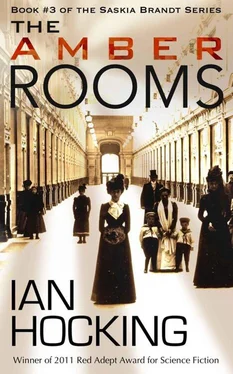‘Sunny expanses are open to us.
The flames of victory light our country
For our happiness lives Comrade Stalin
Our wise leader— here comes my favourite bit —
and dear teacher.’
Her life had almost left her. It took an effort even to blink.
She shook her head. ‘What could anybody, ever, learn from you, comrade? Listen: My name is Saskia Maria Brandt.’
Soso stared at her. She saw in his face something quite foreign to its lively muscles: the slackness of despair. She raised her hand to his cheek and slapped it softly.
‘Remember me,’ she said.
Soso turned from her. He opened the lamp and poured its oil over the roof of the dollhouse. He dropped the smouldering wick down the chimney and closed the door. Then the dollhouse was burning and he was gone, and she knew that Krupskaya, Lenin and girl were gone, too. She was more alone than ever.
~
The floorboards might have been a wall of rock. She placed her hands with care, hauled, and hauled again. Each drag of her half-dead body seemed a year coming. She crossed into a dark passageway and turned towards the front door. She looked back. A smear of blood led towards the glow of fire. She could not see the fire itself, but the dollhouse was loud with clicks and pops as it burned. There was a greyness to the air and her throat felt dry. Fortunately, she was low to the ground, and the bleeding had reduced. Either her blood volume was so low that her blood pressure had dropped, or lying on her front helped to compress the wound.
The front door was open. Saskia thought this a mistake until a cool slice of night air chilled the sweat on her forehead and she heard a doubling of the fire-sound behind her. The house was going to burn fast and hot.
Something vibrated against her chest. Saskia groaned.
‘What do you want?’ she whispered.
Keep moving, said Ego. I am attempting to augment your body’s physiological response to the wound.
‘If it’s help you want to give, you’re too late.’
She reached the jamb of the front door and, from the concealment of this darkness, looked into the street. Soso and a coachman were loading an automobile with a trunk. Its weight made the suspension drop. Saskia thought of the encyclopaedias inside. She tried to shout, but her airway had narrowed to a dot. Krupskaya and the girl, Nina, were looking back at the house from the rear of the carriage. They wore hooded travelling cloaks. Lenin, smart in his bowler hat, appeared from the far side of the car and helped the driver and Soso fasten the bindings for the trunk. Then Soso and Lenin entered the automobile and the driver climbed to his high seat. The automobile was away with a clatter of cylinders.
Saskia made fists in despair. Failure in the reality she had come from, and failure in this.
The first neighbours began to arrive before the vehicle had turned the corner of the street. A man on a bicycle slowed, shouted, ‘Fire!’ and rode on. A family of six, dressed for dinner and still wearing napkins, appeared at the front gate. The father opened it and approached the house. His face was more curious than apprehensive, but he gagged on the smoke and put his napkin to his face.
Saskia reached out with her fingers. She became aware that she had stopped breathing.
A second man ran through the gate, passed the father, and continued up the steps. It was Pavel Eduardovitch. Saskia gasped as he rolled her onto her back and pulled her across the threshold by the straps of her rucksack. On the steps, he put an arm around her back and another beneath knees, and shouted at the onlookers—now a dozen—to make way. He carried Saskia into a waiting automobile. It was Count Nakhimov’s Peugeot Bébé and the man in the driving seat was Mr Jenner, the butler with the famous ancestor.
Pavel laid her on the back seat. He pushed himself underneath her head and shoulders and let her head rest on his lap. His finger pushed a lock of hair behind her ear.
‘My God,’ he said. ‘My God.’ Then, ‘Jenner, drive on.’
The car lurched forward. Saskia tried to reach for Pasha’s cheek, but her arm would not move. A darkness, truer than the night, passed over her eyes and she saw nothing. She could not speak or move. There was a weariness in her mind as though she had travelled a thousand years, been many people.
The last senses that remained were hearing and touch. She still heard the car and still felt the fingertips of Pasha as he tidied her hair.
‘Pavel Eduardovitch?’ asked Mr Jenner. His voice was urgent. ‘Count? How is she? I know a doctor two streets away. We’ll be there directly.’
‘There’s—’ Pasha began, but his voice cracked. He swallowed. ‘“Through the prayers of our holy fathers, Lord Jesus Christ, Son of God, have mercy on us.”’
Saskia wondered if her expression was peaceful. In truth, the expression was no longer hers. It belonged to Ute. Those connections between Ute’s musculature and Saskia’s mind—as it lived, dead, on a chip—were failing.
‘“Deliver me, O Lord, from my enemies; In You I take shelter.”’
The pitch of the engine, which had lowered, and the stuttering sobs of the man holding her head, began to fade. Saskia felt as though she were floating.
Ego vibrated against her chest.
I know you are not Saskia , he Morsed. Once, you thanked me. Your mission to kill Joseph Vissarionovich Stalin is not sanctioned by Meta. However, I am permitted some operational independence. I will complete a modified form of your mission using the help of Mr Jenner and the Count. I overheard Lenin make a telephone call to a man called Gorky. The money will be held overnight in a disused section of the Jungfrau railway, inside a mountain called the Eiger. Tonight, it will be destroyed, though Stalin will live. This is how I thank you, whoever you are.
Saskia felt angry at this dilution of her plan. She had focused on killing Soso. True, she had understood that another monster, greater than him, could turn the energy and luck of the Party to a still more murderous direction, but it had always been him, his face, the grin of Stalin and avuncular, amber eyes that represented that monologue deadening greater part of the twentieth century, and the Russias, and her future. Perhaps there was wisdom in Ego’s decision. With this money gone forever, the intrigues and weapons and bribes that the Party needed would be gone, too. Might this embarrassment, traced to Lenin and the Georgian Highlander, be the true end of the Party? What might take its place?
She would never know. Her body had died, and she was condemned to limbo until her chip was destroyed in a crematorium, or trickled out of power in a grave.
Quite distantly, she felt Pasha unbutton her collar.
‘Something is here,’ he said. ‘It buzzes like a bulb.’
‘Be careful, sir.’
‘It’s a business card for a Ms Tucholsky. Silly girl must have kept it from her time in St Petersburg. On the back it says, ‘P—If something happens, the money is going to the Eiger, JF Railway. Talk to BRYULLOV @ Embassy in Berne. Yrs, M T.’’
Saskia felt as though she smiled.
‘Clever,’ said Mr Jenner. ‘I wish I’d known her.’
‘Me, too,’ said Pavel Eduardovitch.
The silence came like cold water closing above her head. She opened her eyes in the airless gloom to see scintillas of light on the sea floor: amber, the resin of antiquity.
The last words of Pavel Eduardovitch reached her as thought, not sound.
O Lord, revive me, for Your name’s sake. For Your righteousness, deliver my soul from danger.
She might have felt lips in the centre of her forehead.
Читать дальше












